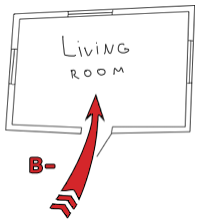Verbs of Motion with the prefixes “в-”, “вы-”
The Russian language has special prefixes which, if added to verbs of motion, denote direction and thus help people understand each other correctly.
Part1.Prefix “в-”
The prefix в- denotes movement to the inner part of an object. The key point here is that somebody or something moves from the outside to the inside. Verbs with the prefix в- answer the question Куда? (“Where?”)

- Я сейчас вхожу
в офис. - I am going into the office now.
- Ты входишь
в метро. - You are going into the metro.
- Мы входим
в ресторан. - We are going into
the restaurant.
Table & examples: Meanings of groups of verbs оf motion with prefixes “в-” and “вы-”
Remember
Verbs of motion with prefixes have one peculiarity: the Present Tense usually requires a verb from the “ходить” group, as they show that the action is taking place right now. Verbs from the “идти” group are used in the Past Tense in the meaning of a completed action or in the Future Tense in the meaning of potential result.
“войти” group
“входить” group
Past Tense
Meaning: Result of an action. Used frequently.
Optional meaning: two actions are taking place
or took place simultaneously.
- Он уже вошёл в класс.
- Я был на улице, а потом вошёл в магазин.
- Когда он входил в класс, прозвенел звонок.
- Когда я входил в магазин, я говорил по телефону.
Present Tense
Meaning: A process. Used frequently.
———————
- Павел входит в офис.
- Машина въезжает в гараж.
Future Tense
Meaning: potential, predictable result. Used frequently.
Optional meaning: two actions are/will be taking place simultaneously.
- Через 5 минут он войдёт в класс.
- Директор скоро войдёт в конференц-зал.
Когда директор будет входить в зал, всем нужно
встать.
Part2.Prefix “вы-”
The prefix вы- denotes movement directed from the inside to the outside. The pattern is usually used to emphasize the fact that somebody or something has left some place. Verbs with the prefix вы- answer the questions Откуда? — Куда?
(“From where?—where?”)

- Я сейчас выхожу
из офиса. - I am going out of the office
now.
- Ты выходишь
из метро. - You are going out of the metro.
- Мы выходим
из ресторана. - We are going out
of the restaurant.
Table & examples: Meanings of groups of verbs of motion
with prefixes “в-” and “вы-”
Remember
Verbs of motion with prefixes have one peculiarity: the Present Tense usually requires a verb from the «ходить» group, as they show that the action is taking place right now. Verbs from the “идти” group are used in the Past Tense to show a completed action or in the Future Tense to indicate a potential result.
“выйти” group
“выходить” group
Past Tense
Meaning: Result of an action. Used frequently.
Optional meaning: two actions are taking place or took place simultaneously.
- Он вышел из класса 5 минут назад.
- — Где директор?
- — Он вышел на пять минут.
- Когда он выходил из класса, прозвенел звонок.
- Когда директор выходил из офиса,
он разговаривал с секретарём по телефону.
Present Tense
Meaning: A process. Used frequently.
————————
- Он сейчас выходит из класса.
- Поезд выезжает из города.
- Подожди меня! Я уже выхожу!
Future Tense
Meaning: potential, predictable result.
Used frequently.
Optional meaning: two actions are/will be taking place simultaneously
- Через 5 минут он выйдет из класса.
- Самолёт вылетит через 30 минут.
- Когда он будет выходить из класса, прозвенит
звонок. - Когда самолёт будет вылетать, информация
на табло изменится.
Part3. Table: Conjugation of mostly used verbs of motion with prefixes
“в-” and “вы-”
в-
вы-
“идти” group “ходить” group
“идти” group “ходить” group
войти входить
выйти выходить
Present Tense
- я войду
- ты войдёшь
- он/она войдёт
- мы войдём
- вы войдёте
- они войдут
- я вхожу
- ты входишь
- он/она входит
- мы входим
- вы входите
- они входят
- я выйду
- ты выйдешь
- он/она выйдет
- вы выйдете
- мы выйдем
- они выйдут
- я выхожу
- ты выходишь
- он/она выходит
- мы выходим
- вы выходите
- они выходят
Past Tense
- он вошёл
- она вошла
- они вошли
- он входил
- она входила
- они входили
- он вышел
- она вышла
- они вышли
- он выходил
- она выходила
- они выходили
въехать въезжать
выехать выезжать
Present Tense
- я въеду
- ты ведешь
- он/она въедет
- мы въедем
- вы въедете
- они въедут
- я въезжаю
- ты въезжаешь
- он/она въезжает
- мы въезжаем
- вы въезжаете
- они въезжают
- я выеду
- ты выедешь
- он/она выедет
- мы выедем
- вы выедете
- они выедут
- я выезжаю
- ты выезжаешь
- он/она выезжает
- мы выезжаем
- вы выезжаете
- они выезжают
Past Tense
- он въехал
- она въехала
- они въехали
- он въезжал
- она въезжала
- они въезжали
- он выехал
- она выехала
- они выехали
- он выезжал
- она выезжала
- они выезжали
влететь влетать
вылететь вылетать
The verbs “влететь” and “влетать”
are not commonly used.
Present Tense
- я вылечу
- ты вылетишь
- он/ она вылетит
- мы вылетим
- вы вылетите
- они вылетят
- я вылетаю
- ты вылетаешь
- он/ она вылетает
- мы вылетаем
- вы вылетаете
- они вылетают
Past Tense
- он вылетел
- она вылетела
- они вылетели
- он вылетал
- она вылетала
- они вылетали
Part4.Prefixes and nouns
Besides verbs, these prefixes can also be added to nouns. The resulting words also denote direction
в-
вы-
- вход (entrance)
- въезд (vehicle entrance)
- —————
- выход (exit)
- выезд (vehicle exit)
- вылет (a zone of aircraft departure)
Remember
The prefixes “в-” and “вы-” denote a very precise change of position within a limited space
and specify whether it is directed inside or outside
 rt.com
rt.com


